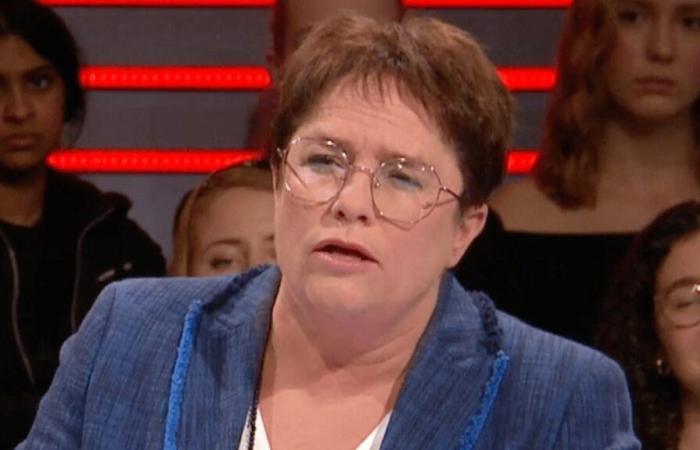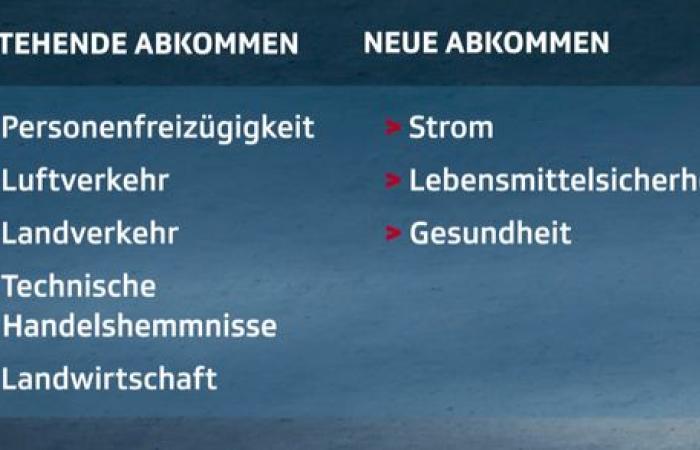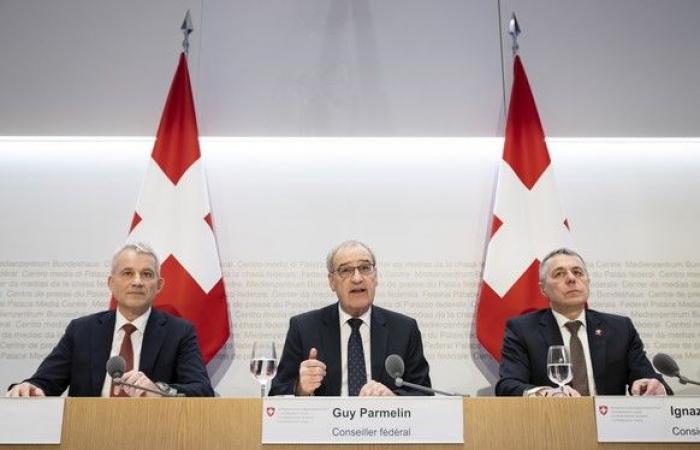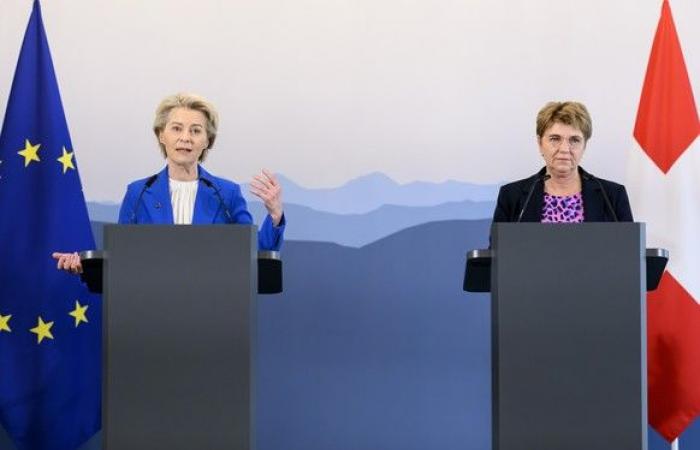Review
The Swiss political year ends with two bangs. On Friday, the Federal Council presented the EU treaty package and the PUK presented its report on the CS decline. A lot of work for everyone in the last “arena” of the year.
Major day of struggle in Swiss politics. After months of work, the Federal Council and the CS-PUK actually presented their results on the same day.
This had to be discussed at a large scale, which is why Swiss television invited high-ranking people to the “Arena”.
With the exception of GLP Councilor of States Tiana Moser – an important voice in Bern even without a presidential office – only party leaders were present for the last debate before the big Christmas presents. Below is the guest list:
- Magdalena Martullo-Blocher, Vice President SVP
- Thierry Burkart, President of the FDP
- Gerhard Pfister, President Mitte
- Tiana Moser, Councilor of States GLP/ZH
- Lisa Mazzone, President of the Greens
- Mattea Meyer, Co-President SP
Now it was time to reflect on what had been decided and what had happened. What lessons can be learned from the CS debacle? Which institutions do we need to take a closer look at? Has the Federal Council struck a good deal with the EU? What does the treaty drawn up mean for immigration? The opinions were of course contradictory. Quod erat expectandum. And with that into the ring.
Ready, set, go
It is not known whether Magdalena Martullo-Blocher jogged to the “Arena” studio. In any case, she had already completed the warm-up phase. The broadcast had barely begun when the SVP National Councilor expressed her displeasure with the contracts with the EU:
“What we see here is a disaster, a misery.”
Martullo-Blocher warned that with the deal, Switzerland would submit to the EU, adopt EU law and exchange its own good system for the EU's much worse one.
Later in the broadcast, the SVP National Councilor made a verbal all-round attack on EU law: “The EU makes laws, we have to adopt them. If not, we will be punished.” Visibly annoyed, she added:
«How stupid are we to want to adopt tens of thousands of pages of disadvantageous regulations? The bureaucrats in Brussels dictate our law.”
Magdalena Martullo-Blocher (SVP): “The EU decides on the punitive measures”
Video: srf/arena
She hoped that the Federal Council would have the backbone to prevent this from happening again. Now it is up to Parliament and perhaps the electorate to decide on the agreement with the EU, said Martullo-Blocher.
An important point. Because the deal with the EU is far from being set in stone.
The consultation should start before the summer break in 2025, and the contract package will come to parliament at the beginning of 2026. It is still unclear whether only the people or the cantons will have to agree in a further step. A vote is not expected before 2028.
Unlike Martullo-Blocher, Thierry Burkart is well disposed towards the venture with the EU. The FDP President praised his Federal Councilor and Foreign Minister. Thanks, among other things, to Ignazio Cassis, there is now a significantly better result in Switzerland's interests than the framework agreement that was buried in 2021.
Thierry Burkart (FDP): “Improvements have been achieved with the new contract text”
Video: srf/arena
Burkart advocated a pragmatic approach, weighing up the advantages and disadvantages. Euphoria is out of place. This could explain the appearance of Federal Councilors Cassis, Jans and Parmelin at the media conference, none of whom exactly burst into cheers despite the deal.

Three more agreements are to be added to the five existing agreements.bild: screenshot srf
SP co-president Mattea Meyer also sees a lot of positive things in the agreement:
“Good relations with the EU are crucial for our prosperity, a functioning Switzerland, for our jobs, for all of us.”
The connection with the EU is close, every 15th working person in Switzerland is a cross-border commuter. Meyer is only concerned about wage protection, as the Federal Council cannot yet show how it intends to fulfill the promises made.
Switzerland has to pay
In a next step, the costs were discussed in the “Arena”. In order for Switzerland to gain access to the EU internal market, it must put 350 million francs on the table annually from 2030 to 2036. So far it has been 130 million francs per year.
The money – it benefits poorer EU member states – is a thorn in the side of SVP National Councilor Martullo-Blocher. Switzerland has 33 free trade agreements with 44 partners and does not have to pay anything anywhere. In addition: “350 million is only a part, there will be more to come.”
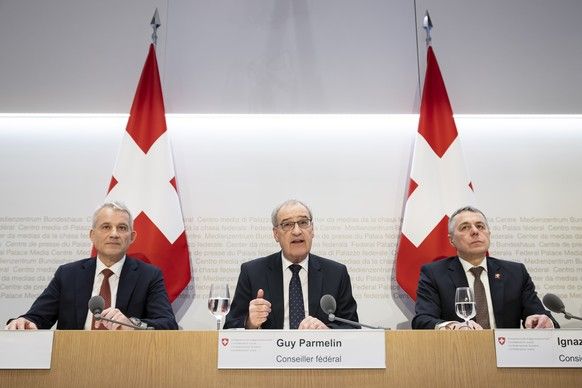
Federal Councilors Beat Jans, Guy Parmelin and Ignazio Cassis provide information to the media.Bild: keystone
This is where Gerhard Pfister came into play. The centrist president pointed out that Switzerland was also aware of compensation payments. What is important for Pfister is that Switzerland can have a say in where its money goes:
“In recent years we have increasingly achieved that the EU uses our money primarily where it is crucial for migration. For example in states with external borders.”
But neither this argument nor that of Mattea Meyer, according to which Switzerland's participation in the EU internal market is a matter of give and take, were able to convince Martullo-Blocher.
She pointed out that even the rich countries of the EU were significantly worse off than Switzerland. “Swiss economic output per person is twice as high, income is 50 percent higher, and unemployment is a third of that in the EU. We don’t want to level ourselves down.”
Green Party President Lisa Mazzone couldn't do anything with that. It is arrogance to believe that Switzerland can manage on its own. Despite all the prophecies of doom from the right, the EU still exists and is managing to master the biggest challenges, such as climate protection and digitalization. Switzerland is nowhere there.
Safeguard clause
It is a fundamental change compared to the current treaty: the negotiated protective clause to limit immigration. Unlike the old agreement, Switzerland can take independent measures regarding the free movement of people. However, in return, the EU may decide on compensatory measures that go beyond the free movement of people.
The SVP cannot find anything positive about the newly negotiated protective clause. SP co-president Mattea Meyer, on the other hand, referred to Switzerland's dependence on foreign workers. “Every third person who works in a hospital comes from abroad. If you don't want immigration, you will destroy prosperity in Switzerland.”

EU Commission President Ursula von der Leyen and Federal President Viola Amherd.Bild: keystone
For Center President Gerhard Pfister, it is important that Switzerland now work out domestically when the protective clause should be activated. “Switzerland should have the authority to limit above-average migration in certain sectors or regions.”
In response to Meyer's vote, Pfister emphasized the high wages that certain foreign skilled workers receive:
“As a result, immigration creates enormous pressure on rental costs and infrastructure, especially in cities. You have to have an answer to that, otherwise social peace will suffer.”
Gerhard Pfister (center): “We have to talk about how much growth makes sense”
Video: srf/arena
Thierry Burkart believes that this answer has not yet been given by the SP, among others. Burkart alluded, among other things, to the motorway expansion that was rejected a month ago.
PUK to CS decline
After an hour of debating the completed EU treaty package, the assembled political group was then allowed to judge the PUK report on the CS decline.
SP co-president Mattea Meyer took advantage of the moment and took the bourgeois politicians to task. Ten out of fourteen members of the PUK come from parties that received money from the CS and are now financially supported by UBS. And further:
“There was certainly great interest in publishing the PUK report on the last day before the Christmas holidays, when the EU deal was just being announced. So that there is as little talk about this report as possible.”
Mattea Meyer (SP): “The CS knew that politicians weren’t looking closely”
Video: srf/arena
The political intelligence, which was “so closely” linked to the top of the bank, was one of the reasons why CS was able to pay out 30 billion in bonuses at the same time during a period of 30 billion francs in losses. “The CS knew that politicians were not looking closely and were also weakening financial market supervision.”
FDP President Thierry Burkart did not let this attack sit:
“With all the regulations that are possible, if things are handled the way CS was handled, the downfall of a company cannot be prevented.”
Mitte President Gerhard Pfister also couldn't do anything with Meyer's general criticism of the PUK: “To say now that this is a report from the majority of lobbyists, I find it grossly negligent and also disrespectful to the members of the PUK, who have put in a lot of effort.”
GLP Councilor of States Tiana Moser reinforced Pfister's views by pointing out that the PUK report was unanimously approved by the members of the PUK, which was compiled according to party strength. A consensus that is not mandatory.
Ultimately, opinions on the PUK report were quickly expressed. For the Left-Green Party, the bourgeois' “cozy policy” is to blame; it enabled the downfall of the big bank. The commoners, on the other hand, largely see the mistake as the mismanagement of Credit Suisse.
After a record-breaking 90 minutes, the EU and PUK “Arena” and with it a long, eventful day came to an end. From January 10, 2025, political swords will be crossed again in Leutschenbach.

